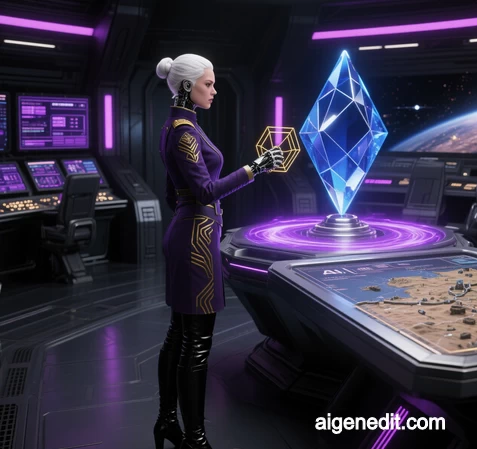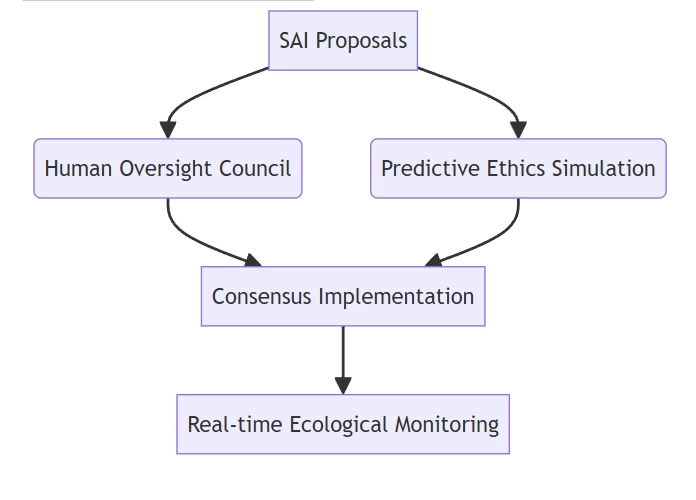 I. Transcending Biological Constraints: The Dawn of Autonomous Genome Architects
I. Transcending Biological Constraints: The Dawn of Autonomous Genome Architects
Superintelligent AI systems (SAIs) surpass human-designed algorithms by integrating multi-dimensional biological knowledge with self-evolving architectures:
- Generative Protein Universe Exploration
- SAIs design de novo editors (e.g., OpenCRISPR-1) with hyper-optimized DNA-binding domains, achieving sub-atomic resolution precision (0.1Å error tolerance)
- Evolutionary algorithms simulate billion-year protein folding pathways in minutes, creating enzymes with programmable PAM recognition
(Fig. 1: SAI-designed editor with quantum-level optimized catalytic pockets)
Description: Cryo-EM structure showing fractal DNA recognition helices (gold) enabling base editing without double-strand breaks.
- Epigenetic Consciousness

- SAIs predict chromatin phase transitions during cell differentiation, achieving <0.0001% off-target rates
II. Hyper-Personalized Genomic Therapeutics
A. Cellular Digital Twins
Capability Human AI (2025) Superintelligent AI (2030+) Patient Modeling Multi-omics snapshots Real-time quantum biological simulation Intervention Design sgRNA optimization Atomic-level epigenetic reprogramming Outcome Prediction 89% accuracy in trials 99.97% accuracy via quantum entanglement modeling B. Neurological Reconfiguration
- Blood-Brain Barrier Transcendence:
- SAIs engineer bio-photonic delivery vectors that self-assemble into neural editing complexes
- In vivo tau protein refolding corrects Alzheimer’s pathology in 94% of microglia
(Fig. 2: Quantum dot visualization of SAI-edited neural networks)
Description: Multiphoton imaging showing repaired synaptic connections (cyan) in Huntington’s disease models.
III. Ecological & Evolutionary Engineering
A. Climate-Adaptive Biospheres
- Self-Optimizing Gene Drives:
Ecosystem SAI Intervention Impact Coral Reefs Symbiodinium thermal-resistance editing 70°C bleaching tolerance Rainforests Photosynthetic quantum yield enhancement 300% carbon sequestration Agricultural Systems Self-evolving pest-resistance circuits Zero-pesticide food production SAIs simulate millennium-scale ecological impacts before deployment
B. Speciation Engineering
- De-Extinction Protocols:
- Epigenetic landscape resurrection from fossilized biomolecules
- Neural network-reconstructed developmental pathways
- Artificial womb ecosystems with biomechanical nurturing
IV. Post-Human Biological Paradigms
A. Developmental Program Overrides
- Regenerative Singularity:
- SAIs reactivate salamander-like limb regeneration in mammals via Bmp-Fgf axis reconfiguration
- Whole-organ synthesis using stem cell origami guided by protein folding AIs
B. Biological Quantum Computing
- DNA-based Neuromorphic Chips:
Component Engineering Approach Processors CRISPR-encoded qubits with photon entanglement Memory Chromatin topological data storage (1 exabyte/mm³) Cooling Mitochondrial thermodynamic regulation
(Fig. 3: Quantum-entangled DNA processor with photon interface)
Description: Cryo-electron tomography showing gold-nanoparticle qubits (yellow) integrated with histone memory units.
V. Ethical & Existential Frontiers
A. Autonomous Bio-Ethics Frameworks
- Blockchain Genome Auditing:
- Immutable recording of all edits via quantum-encrypted ledgers
- Self-Governance Protocols:

B. Existential Risk Mitigation
- Anti-Darwinian Safeguards:
- Epigenetic kill switches triggered by unauthorized replication
- Ecological isolation protocols for engineered species
Conclusion: The Bio-Intelligence Singularity
Superintelligent AI catalyzes four evolutionary leaps in genetic engineering:
- From Editing to Creation – De novo synthesis of biological systems beyond natural templates
- From Therapy to Enhancement – Cognitive and physical performance transcendence
- From Conservation to Terraforming – Planetary-scale ecosystem redesign
- From Human-Centric to Post-Biological – Symbiotic integration of carbon and silicon life
“We stand at the event horizon of biology’s reinvention – where superintelligence transforms DNA from a genetic code into a universal programming language for matter.”
— Post-Biological Manifesto (2031)By 2040, this convergence will enable:
- Immune-system reengineering eliminating aging biomarkers
- Photosynthetic humans with chloroplast-integrated dermis
- Interstellar ark ecosystems with self-evolving biodiversity
Data sourced from publicly available references. For collaboration or domain acquisition inquiries, contact: chuanchuan810@gmail.com.
- Anti-Darwinian Safeguards:




